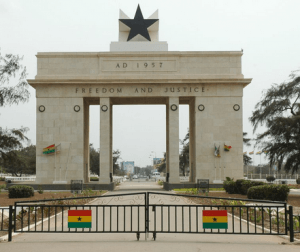How soon would Ghana’s economy come out of the woods?
 Ghana’s economy is in dire straits. A ballooning wage bill, above normal public debt, a never-ending energy crisis and a struggling local currency are crippling growth in a country that was ranked among one of the world’s fastest growing economies only recently.
Ghana’s economy is in dire straits. A ballooning wage bill, above normal public debt, a never-ending energy crisis and a struggling local currency are crippling growth in a country that was ranked among one of the world’s fastest growing economies only recently.
The Bank of Ghana says the country’s total debt stock stands at GH¢94.5 billion, representing 70.9 per cent of GDP.
The country however is expected to recover through reforms following an International Monetary Fund (IMF) programme.
But the IMF Board on April 3, 2015, when approving the $918 million three-year Extended Credit Facility (ECF) for Ghana, classified the country as “high risk of debt distress” under a new debt sustainability analyses (DSA).
According to the IMF, countries classified as high risk are allowed to borrow on non-concessional terms only under exceptional circumstances. This will be one of the first tests of the implementation of the new debt limits policy.
The IMF indicated that the fall in commodity prices is putting pressure on low income countries like Ghana.
During the IMF-World Bank Annual Meetings in Peru, the Governor of the Bank of Ghana, Dr. Henry Kofi Wampah disclosed that the country has lost about $3 billion in revenues as result of the fall in the world market prices of commodities.
“Ghana’s economy has indeed been hit hard by the falling commodity prices,” he said.
“Three commodities form 80 per cent of exports; gold, cocoa, and oil, therefore the price shocks have had a significant effect on the country’s reserves and accelerated volatility in some cases,” he said.
Dr. Wampah added, “for example, between 2012 and now, gold shocks have led to a loss of more than $2 billion in revenue, while shocks in cocoa prices have resulted in more than $1 billion in revenue. These fluctuations complicate monetary policy implementation.”
There are however fears that the economy could suffer much more setbacks as 2016 draws near. 2016 is an election year and governments tend to spend above budget in such times.
Both the World Bank and the IMF have raised concerns about the possibility of budget overrun, as it happens in every election year.
The World Bank fears that the country might not be able to stay within budget as 2016 beckons and the implementation of the recently acquired International Monetary Fund (IMF) Programme is likely to suffer slippages.
The programme is intended to provide financing, policy direction and monitoring and addresses Ghana’s key credit weakness through prioritising fiscal consolidation, raising revenue and improving Central Bank credibility.
The IMF, however, has called on the government to identify the full cost of the 2016 elections ahead of time and make provision for it.
The government recently issued a $1 billion Eurobond at an interest rate of 10.75 per cent over 15 years. According to the Minister of Finance, Seth Terkper, the funds would be used to service maturing debts.
The Bank of Ghana has consistently engaged in fiscal tightening and with the interest rate at 25 per cent, the private sector is unable to borrow to invest, as a result commercial banks only lend to government through the 91 Day Treasury Bills.
The energy crisis and the crowding out of the private sector in access to credit, seems to have stifled the economy by stunting indigenous investments and killing growth.
There are also the effects of public corruption and mismanagement of public funds on the economy.
At this point it is hard to believe that the government would bite the bullet and steer the economy out of the woods by taking the hard decisions, because as evidenced by historical experiences, much of what government says it would do about the economy is often rhetoric and propaganda.
By Emmanuel K. Dogbevi
